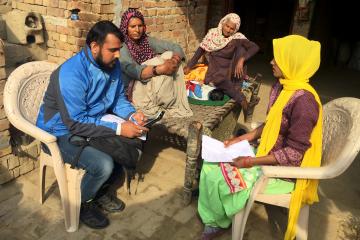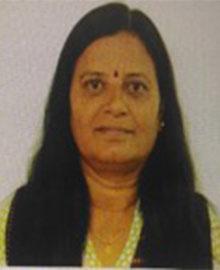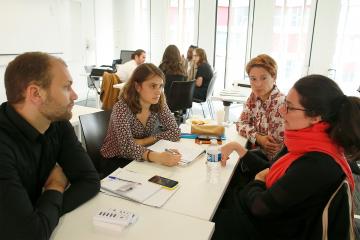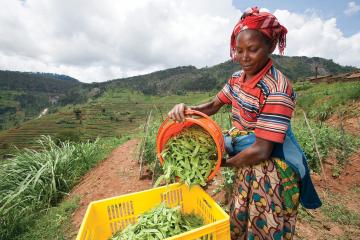
Voices from the field: Enumerator spotlight

J-PAL affiliates have now conducted over 1,000 randomized evaluations in 84 countries, scaling up a Nobel Prize-winning approach to poverty alleviation research. To celebrate this milestone, we’re highlighting the people who have facilitated this research throughout the years.
At the core of our work are our regional offices, which implement our affiliates’ field projects, build partnerships for evidence-informed policymaking, and help partners scale up effective programs. Our first and largest regional office, J-PAL South Asia, was established in 2007 at the Institute for Financial Management and Research in India.
J-PAL South Asia currently works with around 1,150 active field staff (also known as enumerators). Each randomized evaluation requires 40 to 100 enumerators per project who are trained in data collection, data management, and community engagement.
In this spotlight piece, I spoke with three former enumerators and current staff at J-PAL South Asia to shed light on their important roles.
Enumerators are primarily responsible for collecting the data behind every evaluation. They have direct contact with respondents and are responsible for ensuring the quality of data collected, and ultimately on the quality of data output.
Depending on the research project, they must also be willing to travel and work in remote communities, live within the assigned districts or field stations during the period of the survey, and speak local languages.

Meet Hansa Parmar, Senior Survey Manager
Positions at J-PAL: Field Manager (Read India in Uttarakhand); Survey Coordinator (Delhi Voters Project; Mother Literacy; HTB in Delhi, Punjab, Madhya Pradesh, Uttar Pradesh, and Chhattisgarh; Delhi Tuition; and others); and Team Lead of Survey Operations.
Hansa started working in 1993 as a stitching and tailoring supervisor at a garment factory. In 1999 she came across J-PAL’s close partner, Pratham, and joined them on their Balsakhi remedial tutoring and computer assisted learning (CAL) program.
In August 2008 she joined J-PAL South Asia as a field manager for the Read India project in Uttarakhand, which was a good fit for her as she “wanted to still be connected with an organization that is working for poverty alleviation.”
After the Read India project, Hansa was promoted to survey coordinator, in which she was responsible for supporting projects in the field and leading survey operations with project associates across nine projects. After three years as a survey coordinator, she was then promoted to team lead across the northern region, covering six to seven states while supervising three survey coordinators, who underneath them have around 25 to 30 project associates.
Hansa’s day-to-day varies, as her role requires being in the field as much as it requires her to focus on the planning, monitoring, and tracking of activities from her desk. A visit to the project site in the field involves operational aspects, assessing information management (as required by the project supervisor), and working closely with the project associates to understand any issues and challenges they are facing, while trying to address any bottlenecks.
Another key focus during project field visits is to ensure that the enumerators and other field staff carrying out the data collection on the ground are well trained, both on the survey instrument, the correct surveying methods, informed consent for human subjects, and research compliance.
Additionally, as one of the key priorities of the research operations vertical, Hansa and J-PAL South Asia are working on strengthening capacities of staff at various levels through regional training programs, which in turn helps build an infrastructure throughout South Asia to make rigorous research more accessible to researchers.
“This indeed is a proud moment for all of us at J-PAL. Our founders being recognized with the Nobel Prize gives us all a sense of pride, especially when I let others know that I am working with these amazing people and that I am associated in some way with the work. This also means that we [J-PAL staff] need to be even more hard working and be prepared for increased opportunities to work across various sectors due to this new recognition.”

Meet Suraj Kumar, Project Associate
Positions at J-PAL: Project Associate (Voter Information Project in Delhi, Haryana Education Project, Learning Camps in Uttar Pradesh, and Math Games).
Suraj started working with J-PAL’s close partner, Pratham, in 2004 as a supervisor and district coordinator, and conducted the Annual Status of Education Report (ASER) training every year across Haryana. He came across J-PAL South Asia in 2006 while working on a joint J-PAL/Pratham study as a trainer and field monitor.
In 2010 Suraj was offered a project associate position on the voter information project in Delhi. As a project associate, Suraj’s role requires him to lead the field and survey operations on the ground. Some of the key aspects of his role include:
- Hiring field staff (coordinating with the Administrative and Finance team for timely contract creation and salary dispersal for the entire field team),
- Training field staff (ensuring that J-PAL’s minimum must do’s for high-quality research are being followed),
- Working closely with research associates to cross-check incoming data through data entry cleaning and rigorous checks to ensure the highest quality; this also includes conducting qualitative checks in the field during data collection,
- Managing the field office [near the project site] and managing vendor billings (those who are providing field data collection services).
At times he also supports other J-PAL South Asia projects on field staff hiring and training.
On J-PAL co-founders Abhijit Banerjee and Esther Duflo, along with long-time J-PAL affiliate Michael Kremer, winning the Nobel Prize in Economics, Suraj says he thinks this will help setup new collaborations and build upon the important work that we are already doing. Personally, this brings “a sense of pride and satisfaction” to his own work, as “the recognition is for us and our work as well.”

Meet Kamal Singh Jhala, Project Associate
Positions at J-PAL: Surveyor, Supervisor, & Field Monitor (MIT Health Project Udaipur); Field Manager (Learning Camps in Uttar Pradesh); Project Associate (Breakthrough Project in Haryana, Mindspark Scale Up in Rajasthan, & others).
Kamal was always interested in the idea of working in the field, traveling to unfamiliar regions, and getting to know people there since he feels that he always had a special instinct for talking to people. That is why in 2007 he decided to join J-PAL South Asia as an enumerator for the MIT health project in Udaipur.
This project was developed in partnership with Seva Mandir and Vidya Bhawan Society. After thorough training on data collection, surveying quality, and mentorship from J-PAL South Asia senior staff, Kamal was promoted to field monitor in 2009. In 2015 he became a field manager for an education project in Uttar Pradesh, and then eventually was promoted to project associate. In total, Kamal has worked on eight randomized evaluations for J-PAL South Asia.
A typical day during the planning phase of a project includes procuring survey tablets, setting up network connectivity on the ground to use the tablets, and working closely with research assistants to set up the digitization process.
Over the past thirteen years, Kamal has witnessed the transition from paper-based surveys to tablet-based surveys at J-PAL. With tablet-based surveys, he says management of data has become easier. In earlier days, field staff would have to count the surveys manually, and have a separate room for storing paper surveys. Now almost everything is done on a tablet, so managing and monitoring data has become easier. However, tablet-based surveys are not applicable everywhere especially for education surveys as students are not familiar with tablets.

Once field work starts, Kamal works closely with survey coordinators and field managers to ensure that everything is in place. The first eight to ten days of a project involve more field intensive tasks, like focusing on setting up smooth logistics and operations, while later efforts primarily involve ensuring the quality of the data being collected.
When Kamal learned the news of the Nobel Prize in October, calls from old colleagues who he worked with in 2007-2008 in Udaipur started pouring in, and they all exchanged their happiness and sense of pride in the work they did. Kamal’s old project team got together and they all celebrated.
“I have always been proud of my work, but now I am prouder than ever of working and knowing such esteemed economists who have brought a revolution in the field of development economics.”



